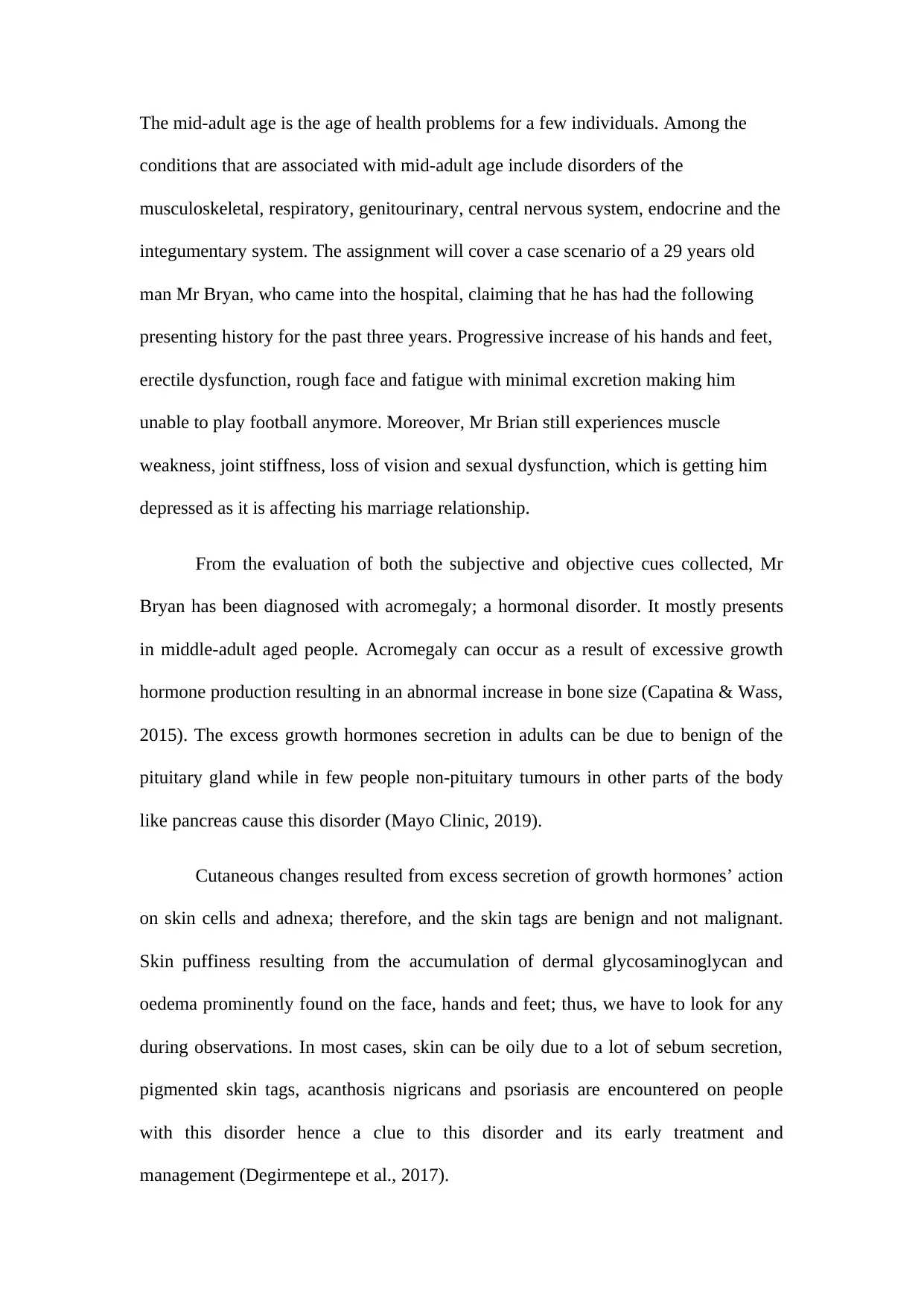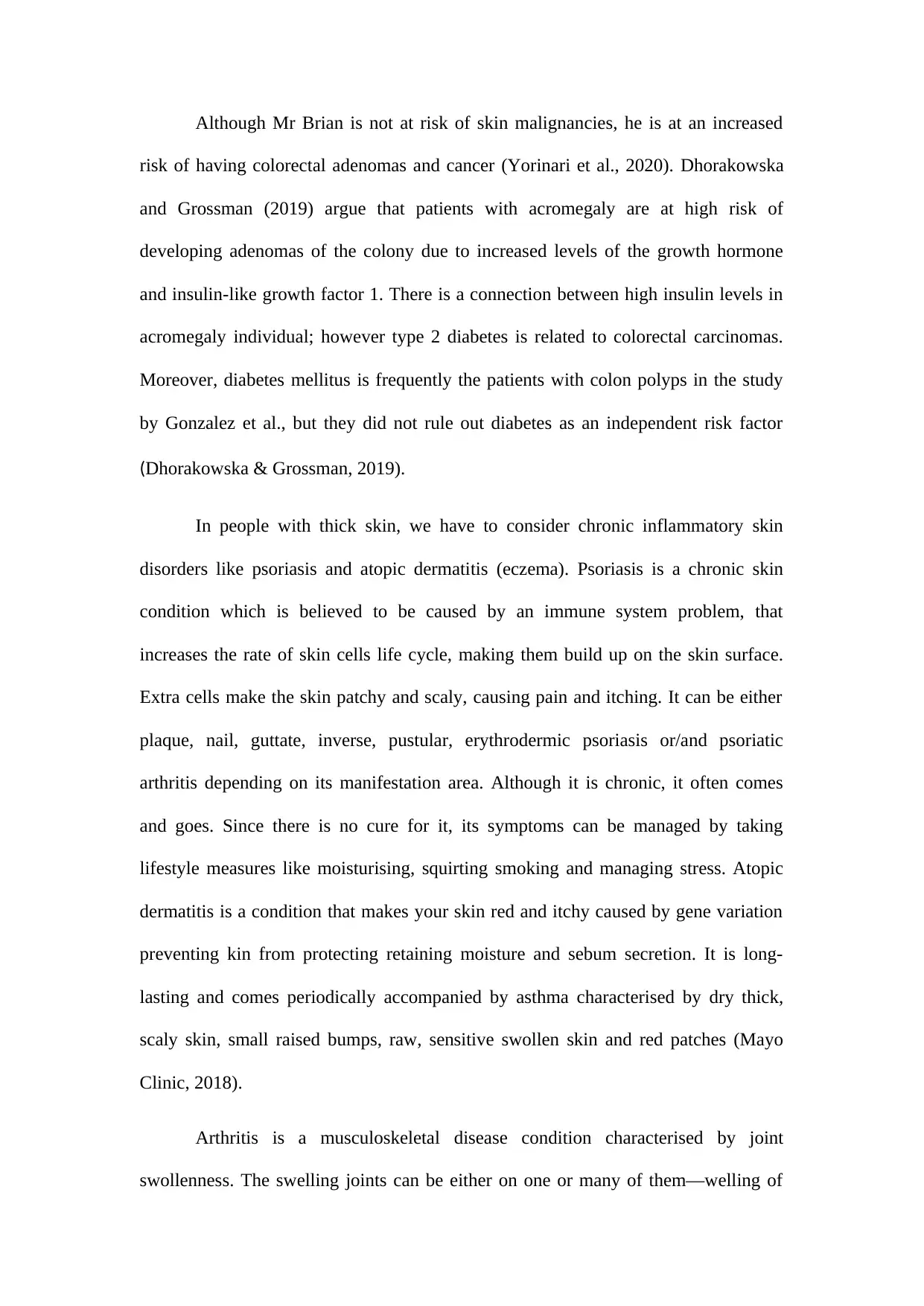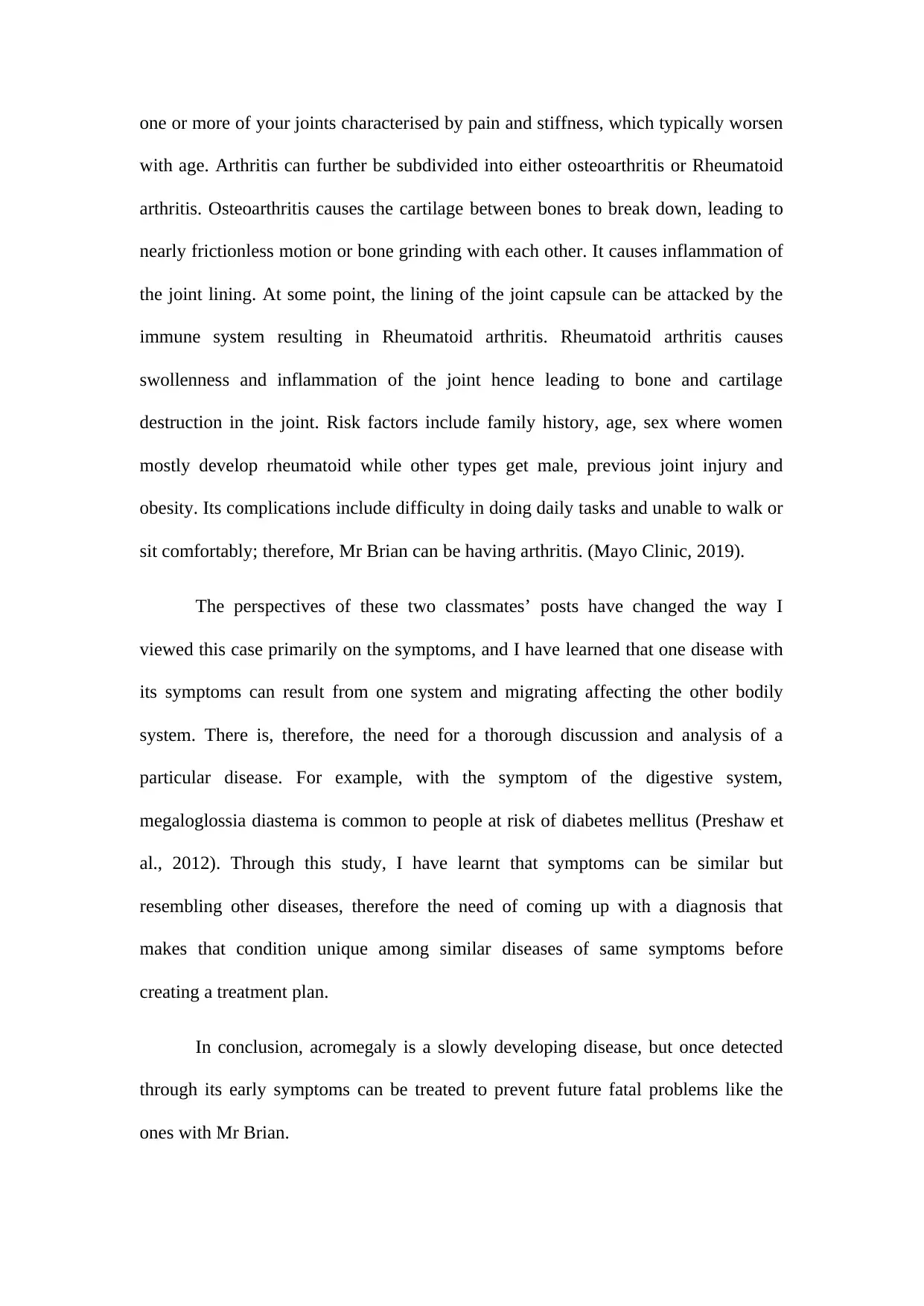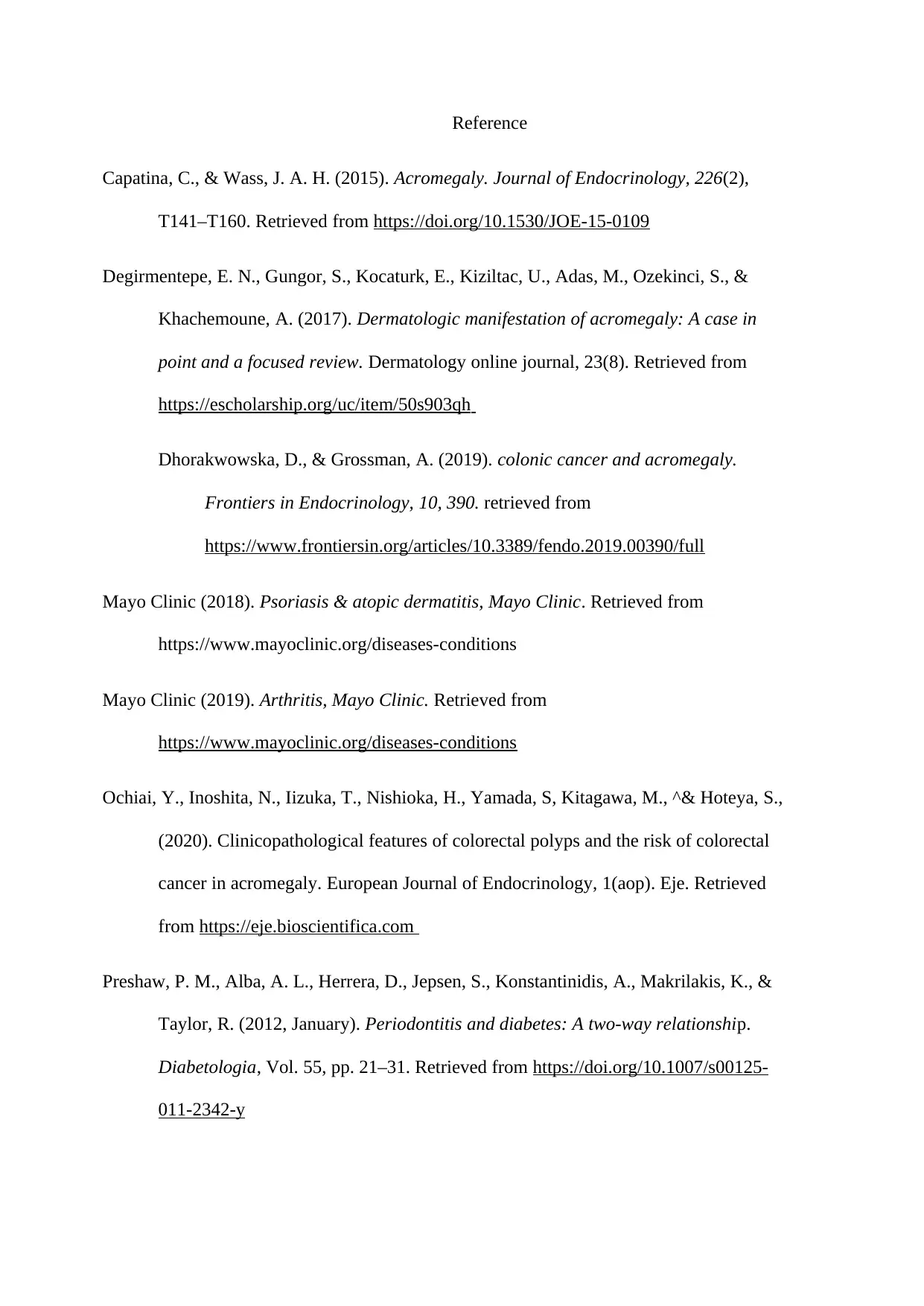Case Study: Pathophysiology of Acromegaly, Symptoms and Diagnosis
VerifiedAdded on 2022/08/16
|7
|1329
|17
Case Study
AI Summary
This case study presents a 29-year-old man, Mr. Bryan, exhibiting symptoms of acromegaly, a hormonal disorder characterized by excessive growth hormone production. The assignment details his progressive symptoms over three years, including enlarged hands and feet, erectile dysfunction, fatigue, muscle weakness, joint stiffness, and vision loss, leading to a diagnosis of acromegaly. The paper explores the pathophysiology of acromegaly, focusing on the impact of excess growth hormones on the skin, musculoskeletal, and other systems, and the potential for related conditions such as arthritis and diabetes. The analysis includes a discussion of cutaneous changes, such as skin tags and oily skin, and the increased risk of colorectal adenomas and cancer. The study highlights the interconnectedness of symptoms across different body systems and the importance of a thorough diagnostic approach to differentiate acromegaly from other conditions with similar symptoms, emphasizing the need for early detection and treatment to prevent complications. The paper also reflects on the learning gained from reviewing classmates' perspectives on the case, underscoring the value of comprehensive analysis in clinical settings.

Pathophysiology
Student’s name;
Course unit;
Institutional affiliation;
Honorary lecturer;
Date of submission;
Student’s name;
Course unit;
Institutional affiliation;
Honorary lecturer;
Date of submission;
Paraphrase This Document
Need a fresh take? Get an instant paraphrase of this document with our AI Paraphraser

The mid-adult age is the age of health problems for a few individuals. Among the
conditions that are associated with mid-adult age include disorders of the
musculoskeletal, respiratory, genitourinary, central nervous system, endocrine and the
integumentary system. The assignment will cover a case scenario of a 29 years old
man Mr Bryan, who came into the hospital, claiming that he has had the following
presenting history for the past three years. Progressive increase of his hands and feet,
erectile dysfunction, rough face and fatigue with minimal excretion making him
unable to play football anymore. Moreover, Mr Brian still experiences muscle
weakness, joint stiffness, loss of vision and sexual dysfunction, which is getting him
depressed as it is affecting his marriage relationship.
From the evaluation of both the subjective and objective cues collected, Mr
Bryan has been diagnosed with acromegaly; a hormonal disorder. It mostly presents
in middle-adult aged people. Acromegaly can occur as a result of excessive growth
hormone production resulting in an abnormal increase in bone size (Capatina & Wass,
2015). The excess growth hormones secretion in adults can be due to benign of the
pituitary gland while in few people non-pituitary tumours in other parts of the body
like pancreas cause this disorder (Mayo Clinic, 2019).
Cutaneous changes resulted from excess secretion of growth hormones’ action
on skin cells and adnexa; therefore, and the skin tags are benign and not malignant.
Skin puffiness resulting from the accumulation of dermal glycosaminoglycan and
oedema prominently found on the face, hands and feet; thus, we have to look for any
during observations. In most cases, skin can be oily due to a lot of sebum secretion,
pigmented skin tags, acanthosis nigricans and psoriasis are encountered on people
with this disorder hence a clue to this disorder and its early treatment and
management (Degirmentepe et al., 2017).
conditions that are associated with mid-adult age include disorders of the
musculoskeletal, respiratory, genitourinary, central nervous system, endocrine and the
integumentary system. The assignment will cover a case scenario of a 29 years old
man Mr Bryan, who came into the hospital, claiming that he has had the following
presenting history for the past three years. Progressive increase of his hands and feet,
erectile dysfunction, rough face and fatigue with minimal excretion making him
unable to play football anymore. Moreover, Mr Brian still experiences muscle
weakness, joint stiffness, loss of vision and sexual dysfunction, which is getting him
depressed as it is affecting his marriage relationship.
From the evaluation of both the subjective and objective cues collected, Mr
Bryan has been diagnosed with acromegaly; a hormonal disorder. It mostly presents
in middle-adult aged people. Acromegaly can occur as a result of excessive growth
hormone production resulting in an abnormal increase in bone size (Capatina & Wass,
2015). The excess growth hormones secretion in adults can be due to benign of the
pituitary gland while in few people non-pituitary tumours in other parts of the body
like pancreas cause this disorder (Mayo Clinic, 2019).
Cutaneous changes resulted from excess secretion of growth hormones’ action
on skin cells and adnexa; therefore, and the skin tags are benign and not malignant.
Skin puffiness resulting from the accumulation of dermal glycosaminoglycan and
oedema prominently found on the face, hands and feet; thus, we have to look for any
during observations. In most cases, skin can be oily due to a lot of sebum secretion,
pigmented skin tags, acanthosis nigricans and psoriasis are encountered on people
with this disorder hence a clue to this disorder and its early treatment and
management (Degirmentepe et al., 2017).

Although Mr Brian is not at risk of skin malignancies, he is at an increased
risk of having colorectal adenomas and cancer (Yorinari et al., 2020). Dhorakowska
and Grossman (2019) argue that patients with acromegaly are at high risk of
developing adenomas of the colony due to increased levels of the growth hormone
and insulin-like growth factor 1. There is a connection between high insulin levels in
acromegaly individual; however type 2 diabetes is related to colorectal carcinomas.
Moreover, diabetes mellitus is frequently the patients with colon polyps in the study
by Gonzalez et al., but they did not rule out diabetes as an independent risk factor
(Dhorakowska & Grossman, 2019).
In people with thick skin, we have to consider chronic inflammatory skin
disorders like psoriasis and atopic dermatitis (eczema). Psoriasis is a chronic skin
condition which is believed to be caused by an immune system problem, that
increases the rate of skin cells life cycle, making them build up on the skin surface.
Extra cells make the skin patchy and scaly, causing pain and itching. It can be either
plaque, nail, guttate, inverse, pustular, erythrodermic psoriasis or/and psoriatic
arthritis depending on its manifestation area. Although it is chronic, it often comes
and goes. Since there is no cure for it, its symptoms can be managed by taking
lifestyle measures like moisturising, squirting smoking and managing stress. Atopic
dermatitis is a condition that makes your skin red and itchy caused by gene variation
preventing kin from protecting retaining moisture and sebum secretion. It is long-
lasting and comes periodically accompanied by asthma characterised by dry thick,
scaly skin, small raised bumps, raw, sensitive swollen skin and red patches (Mayo
Clinic, 2018).
Arthritis is a musculoskeletal disease condition characterised by joint
swollenness. The swelling joints can be either on one or many of them—welling of
risk of having colorectal adenomas and cancer (Yorinari et al., 2020). Dhorakowska
and Grossman (2019) argue that patients with acromegaly are at high risk of
developing adenomas of the colony due to increased levels of the growth hormone
and insulin-like growth factor 1. There is a connection between high insulin levels in
acromegaly individual; however type 2 diabetes is related to colorectal carcinomas.
Moreover, diabetes mellitus is frequently the patients with colon polyps in the study
by Gonzalez et al., but they did not rule out diabetes as an independent risk factor
(Dhorakowska & Grossman, 2019).
In people with thick skin, we have to consider chronic inflammatory skin
disorders like psoriasis and atopic dermatitis (eczema). Psoriasis is a chronic skin
condition which is believed to be caused by an immune system problem, that
increases the rate of skin cells life cycle, making them build up on the skin surface.
Extra cells make the skin patchy and scaly, causing pain and itching. It can be either
plaque, nail, guttate, inverse, pustular, erythrodermic psoriasis or/and psoriatic
arthritis depending on its manifestation area. Although it is chronic, it often comes
and goes. Since there is no cure for it, its symptoms can be managed by taking
lifestyle measures like moisturising, squirting smoking and managing stress. Atopic
dermatitis is a condition that makes your skin red and itchy caused by gene variation
preventing kin from protecting retaining moisture and sebum secretion. It is long-
lasting and comes periodically accompanied by asthma characterised by dry thick,
scaly skin, small raised bumps, raw, sensitive swollen skin and red patches (Mayo
Clinic, 2018).
Arthritis is a musculoskeletal disease condition characterised by joint
swollenness. The swelling joints can be either on one or many of them—welling of
⊘ This is a preview!⊘
Do you want full access?
Subscribe today to unlock all pages.

Trusted by 1+ million students worldwide

one or more of your joints characterised by pain and stiffness, which typically worsen
with age. Arthritis can further be subdivided into either osteoarthritis or Rheumatoid
arthritis. Osteoarthritis causes the cartilage between bones to break down, leading to
nearly frictionless motion or bone grinding with each other. It causes inflammation of
the joint lining. At some point, the lining of the joint capsule can be attacked by the
immune system resulting in Rheumatoid arthritis. Rheumatoid arthritis causes
swollenness and inflammation of the joint hence leading to bone and cartilage
destruction in the joint. Risk factors include family history, age, sex where women
mostly develop rheumatoid while other types get male, previous joint injury and
obesity. Its complications include difficulty in doing daily tasks and unable to walk or
sit comfortably; therefore, Mr Brian can be having arthritis. (Mayo Clinic, 2019).
The perspectives of these two classmates’ posts have changed the way I
viewed this case primarily on the symptoms, and I have learned that one disease with
its symptoms can result from one system and migrating affecting the other bodily
system. There is, therefore, the need for a thorough discussion and analysis of a
particular disease. For example, with the symptom of the digestive system,
megaloglossia diastema is common to people at risk of diabetes mellitus (Preshaw et
al., 2012). Through this study, I have learnt that symptoms can be similar but
resembling other diseases, therefore the need of coming up with a diagnosis that
makes that condition unique among similar diseases of same symptoms before
creating a treatment plan.
In conclusion, acromegaly is a slowly developing disease, but once detected
through its early symptoms can be treated to prevent future fatal problems like the
ones with Mr Brian.
with age. Arthritis can further be subdivided into either osteoarthritis or Rheumatoid
arthritis. Osteoarthritis causes the cartilage between bones to break down, leading to
nearly frictionless motion or bone grinding with each other. It causes inflammation of
the joint lining. At some point, the lining of the joint capsule can be attacked by the
immune system resulting in Rheumatoid arthritis. Rheumatoid arthritis causes
swollenness and inflammation of the joint hence leading to bone and cartilage
destruction in the joint. Risk factors include family history, age, sex where women
mostly develop rheumatoid while other types get male, previous joint injury and
obesity. Its complications include difficulty in doing daily tasks and unable to walk or
sit comfortably; therefore, Mr Brian can be having arthritis. (Mayo Clinic, 2019).
The perspectives of these two classmates’ posts have changed the way I
viewed this case primarily on the symptoms, and I have learned that one disease with
its symptoms can result from one system and migrating affecting the other bodily
system. There is, therefore, the need for a thorough discussion and analysis of a
particular disease. For example, with the symptom of the digestive system,
megaloglossia diastema is common to people at risk of diabetes mellitus (Preshaw et
al., 2012). Through this study, I have learnt that symptoms can be similar but
resembling other diseases, therefore the need of coming up with a diagnosis that
makes that condition unique among similar diseases of same symptoms before
creating a treatment plan.
In conclusion, acromegaly is a slowly developing disease, but once detected
through its early symptoms can be treated to prevent future fatal problems like the
ones with Mr Brian.
Paraphrase This Document
Need a fresh take? Get an instant paraphrase of this document with our AI Paraphraser


Reference
Capatina, C., & Wass, J. A. H. (2015). Acromegaly. Journal of Endocrinology, 226(2),
T141–T160. Retrieved from https://doi.org/10.1530/JOE-15-0109
Degirmentepe, E. N., Gungor, S., Kocaturk, E., Kiziltac, U., Adas, M., Ozekinci, S., &
Khachemoune, A. (2017). Dermatologic manifestation of acromegaly: A case in
point and a focused review. Dermatology online journal, 23(8). Retrieved from
https://escholarship.org/uc/item/50s903qh
Dhorakwowska, D., & Grossman, A. (2019). colonic cancer and acromegaly.
Frontiers in Endocrinology, 10, 390. retrieved from
https://www.frontiersin.org/articles/10.3389/fendo.2019.00390/full
Mayo Clinic (2018). Psoriasis & atopic dermatitis, Mayo Clinic. Retrieved from
https://www.mayoclinic.org/diseases-conditions
Mayo Clinic (2019). Arthritis, Mayo Clinic. Retrieved from
https://www.mayoclinic.org/diseases-conditions
Ochiai, Y., Inoshita, N., Iizuka, T., Nishioka, H., Yamada, S, Kitagawa, M., ^& Hoteya, S.,
(2020). Clinicopathological features of colorectal polyps and the risk of colorectal
cancer in acromegaly. European Journal of Endocrinology, 1(aop). Eje. Retrieved
from https://eje.bioscientifica.com
Preshaw, P. M., Alba, A. L., Herrera, D., Jepsen, S., Konstantinidis, A., Makrilakis, K., &
Taylor, R. (2012, January). Periodontitis and diabetes: A two-way relationship.
Diabetologia, Vol. 55, pp. 21–31. Retrieved from https://doi.org/10.1007/s00125-
011-2342-y
Capatina, C., & Wass, J. A. H. (2015). Acromegaly. Journal of Endocrinology, 226(2),
T141–T160. Retrieved from https://doi.org/10.1530/JOE-15-0109
Degirmentepe, E. N., Gungor, S., Kocaturk, E., Kiziltac, U., Adas, M., Ozekinci, S., &
Khachemoune, A. (2017). Dermatologic manifestation of acromegaly: A case in
point and a focused review. Dermatology online journal, 23(8). Retrieved from
https://escholarship.org/uc/item/50s903qh
Dhorakwowska, D., & Grossman, A. (2019). colonic cancer and acromegaly.
Frontiers in Endocrinology, 10, 390. retrieved from
https://www.frontiersin.org/articles/10.3389/fendo.2019.00390/full
Mayo Clinic (2018). Psoriasis & atopic dermatitis, Mayo Clinic. Retrieved from
https://www.mayoclinic.org/diseases-conditions
Mayo Clinic (2019). Arthritis, Mayo Clinic. Retrieved from
https://www.mayoclinic.org/diseases-conditions
Ochiai, Y., Inoshita, N., Iizuka, T., Nishioka, H., Yamada, S, Kitagawa, M., ^& Hoteya, S.,
(2020). Clinicopathological features of colorectal polyps and the risk of colorectal
cancer in acromegaly. European Journal of Endocrinology, 1(aop). Eje. Retrieved
from https://eje.bioscientifica.com
Preshaw, P. M., Alba, A. L., Herrera, D., Jepsen, S., Konstantinidis, A., Makrilakis, K., &
Taylor, R. (2012, January). Periodontitis and diabetes: A two-way relationship.
Diabetologia, Vol. 55, pp. 21–31. Retrieved from https://doi.org/10.1007/s00125-
011-2342-y
⊘ This is a preview!⊘
Do you want full access?
Subscribe today to unlock all pages.

Trusted by 1+ million students worldwide

1 out of 7
Your All-in-One AI-Powered Toolkit for Academic Success.
+13062052269
info@desklib.com
Available 24*7 on WhatsApp / Email
![[object Object]](/_next/static/media/star-bottom.7253800d.svg)
Unlock your academic potential
Copyright © 2020–2026 A2Z Services. All Rights Reserved. Developed and managed by ZUCOL.

